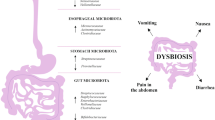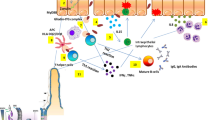Abstract
Purpose
Interleukin-1β (IL-1β) polymorphisms are associated with peptic ulcer and atrophic gastritis. This study aimed to examine effects of corpus atrophy and the genotypes of genes related to peptic ulcer, including IL-1β, on risk of aspirin ulcer.
Methods
232 patients taking 100 mg of aspirin for cardiovascular diseases, of whom 40 had peptic ulcer, were enrolled. IL1β, interleukin-1 receptor antagonist (IL-1RN), tumor necrosis factor (TNF)-α, cyclooxygenase (COX)-1, cytochrome p450 2C9 (CYP2C9), UDP-glucuronosyltransferase (UGT1A6) genotypes were determined, and serum pepsinogen levels were measured.
Results
The polymorphisms of IL-1β-511/-31 were significantly associated with peptic ulcer, but other genotypes were not. Serum pepsinogen I and II levels and I/II ratio were significantly higher in the ulcer group than in the non-ulcer group. Taking PPI [adjusted odds ratio (OR), 0.09; 95% confidence interval (CI), 0.02–0.39], pepsinogen I of less than 50 ng/ml (OR, 0.24; 95% CI, 0.10–0.56) and IL-1β-511 T carrier (OR, 0.42; 95% CI, 0.18–0.93) were significantly associated with peptic ulcer.
Conclusions
Hypoacidity related to corpus atrophy as well as taking PPI seems to be preventively associated with development of peptic ulcer among low dose aspirin users.


Similar content being viewed by others
References
Awtry EH, Loscalzo J. Aspirin. Circulation. 2000;101:1206–18.
Halushka MK, Walker LP, Halushka PV. Genetic variation in cyclooxygenase 1: effects on response to aspirin. Clin Pharmacol Ther. 2003;73:122–30.
Lampe JW, Bigler J, Horner NK, Potter JD. UDP-glucuronosyltransferase (UGT1A1*28 and UGT1A6*2) polymorphisms in Caucasians and Asians: relationships to serum bilirubin concentrations. Pharmacogenetics. 1999;9:341–9.
Bigler J, Whitton J, Lampe JW, Fosdick L, Bostick RM, Potter JD. CYP2C9 and UGT1A6 genotypes modulate the protective effect of aspirin on colon adenoma risk. Cancer Res. 2001;61:3566–9.
Cryer B, Feldman M. Effects of very low dose daily, long-term aspirin therapy on gastric, duodenal, and rectal prostaglandin levels and on mucosal injury in healthy humans. Gastroenterology. 1999;117:17–25.
Kitahora T, Guth PH. Effect of aspirin plus hydrochloric acid on the gastric mucosal microcirculation. Gastroenterology. 1987;93:810–7.
Sato Y, Asaka M, Takeda H, Ohtaki T, Miyazaki T. The mechanisms of aspirin-induced gastric mucosal injury. J Clin Gastroenterol. 1993;17(Suppl 1):S1–4.
Lanas A, Bajador E, Serrano P, Fuentes J, Carreno S, Guardia J, et al. Nitrovasodilators, low-dose aspirin, other nonsteroidal antiinflammatory drugs, and the risk of upper gastrointestinal bleeding. N Engl J Med. 2000;343:834–9.
Lanas A, Garcia-Rodriguez LA, Arroyo MT, Bujanda L, Gomollon F, Forne M, et al. Effect of antisecretory drugs and nitrates on the risk of ulcer bleeding associated with nonsteroidal anti-inflammatory drugs, antiplatelet agents, and anticoagulants. Am J Gastroenterol. 2007;102:507–15.
Sakamoto C, Sugano K, Ota S, Sakaki N, Takahashi S, Yoshida Y, et al. Case-control study on the association of upper gastrointestinal bleeding and nonsteroidal anti-inflammatory drugs in Japan. Eur J Clin Pharmacol. 2006;62:765–72.
Shiotani A, Sakakibara T, Yamanaka Y, Imamura H, Tarumi K, Manabe N, et al. Upper gastrointestinal ulcer in Japanese patients taking low-dose aspirin. J Gastroenterol. 2009;44:126–31.
Shiotani A, Kamada T, Haruma K. Low-dose aspirin-induced gastrointestinal diseases: past, present, and future. J Gastroenterol. 2008;43:581–8.
Shiotani A, Yamaoka Y, El-Zimaity HM, Saeed MA, Qureshi WA, Graham DY. NSAID gastric ulceration: predictive value of gastric pH, mucosal density of polymorphonuclear leukocytes, or levels of IL-8 or nitrite. Dig Dis Sci. 2002;47:38–43.
Garcia-Gonzalez MA, Savelkoul PH, Benito R, Santolaria S, Crusius JB, Pena AS, et al. No allelic variant associations of the IL-1 and TNF gene polymorphisms in the susceptibility to duodenal ulcer disease. Int J Immunogenet. 2005;32:299–306.
Furuta T, El-Omar EM, Xiao F, Shirai N, Takashima M, Sugimura H. Interleukin 1beta polymorphisms increase risk of hypochlorhydria and atrophic gastritis and reduce risk of duodenal ulcer recurrence in Japan. Gastroenterology. 2002;123:92–105.
Zambon CF, Basso D, Navaglia F, Belluco C, Falda A, Fogar P, et al. Pro- and anti-inflammatory cytokines gene polymorphisms and Helicobacter pylori infection: interactions influence outcome. Cytokine. 2005;29:141–52.
Sugimoto M, Furuta T, Shirai N, Nakamura A, Xiao F, Kajimura M, et al. Different effects of polymorphisms of tumor necrosis factor-alpha and interleukin-1 beta on development of peptic ulcer and gastric cancer. J Gastroenterol Hepatol. 2007;22:51–9.
Garcia-Gonzalez MA, Lanas A, Santolaria S, Crusius JB, Serrano MT, Pena AS. The polymorphic IL-1B and IL-1RN genes in the aetiopathogenesis of peptic ulcer. Clin Exp Immunol. 2001;125:368–75.
El-Omar EM, Carrington M, Chow WH, McColl KE, Bream JH, Young HA, et al. Interleukin-1 polymorphisms associated with increased risk of gastric cancer. Nature. 2000;404:398–402.
van Oijen MG, Huybers S, Peters WH, Drenth JP, Laheij RJ, Verheugt FW, et al. Polymorphisms in genes encoding acetylsalicylic acid metabolizing enzymes are unrelated to upper gastrointestinal health in cardiovascular patients on acetylsalicylic acid. Br J Clin Pharmacol. 2005;60:623–8.
van Oijen MG, Laheij RJ, Koetsier M, de Kleine E, Te Morsche RH, van Kerkhoven LA, et al. Effect of a specific cyclooxygenase-gene polymorphism (A-842G/C50T) on the occurrence of peptic ulcer hemorrhage. Dig Dis Sci. 2006;51:2348–52.
Sugimoto M, Furuta T, Shirai N, Nakamura A, Kajimura M, Sugimura H, et al. Effects of interleukin-10 gene polymorphism on the development of gastric cancer and peptic ulcer in Japanese subjects. J Gastroenterol Hepatol. 2007;22:1443–9.
Saeki M, Saito Y, Jinno H, Sai K, Kaniwa N, Ozawa S, et al. Genetic polymorphisms of UGT1A6 in a Japanese population. Drug Metab Pharmacokinet. 2005;20:85–90.
Arisawa T, Tahara T, Shibata T, Nagasaka M, Nakamura M, Kamiya Y, et al. Association between genetic polymorphisms in the cyclooxygenase-1 gene promoter and peptic ulcers in Japan. Int J Mol Med. 2007;20:373–8.
Pilotto A, Seripa D, Franceschi M, Scarcelli C, Colaizzo D, Grandone E, et al. Genetic susceptibility to nonsteroidal anti-inflammatory drug-related gastroduodenal bleeding: role of cytochrome P450 2C9 polymorphisms. Gastroenterology. 2007;133:465–71.
Martinez C, Blanco G, Ladero JM, Garcia-Martin E, Taxonera C, Gamito FG, et al. Genetic predisposition to acute gastrointestinal bleeding after NSAIDs use. Br J Pharmacol. 2004;141:205–8.
Takahashi H, Kashima T, Nomizo Y, Muramoto N, Shimizu T, Nasu K, et al. Metabolism of warfarin enantiomers in Japanese patients with heart disease having different CYP2C9 and CYP2C19 genotypes. Clin Pharmacol Ther. 1998;63:519–28.
Takahashi H, Echizen H. Pharmacogenetics of warfarin elimination and its clinical implications. Clin Pharmacokinet. 2001;40:587–603.
Samloff IM, Secrist DM, Passaro E Jr. A study of the relationship between serum group I pepsinogen levels and gastric acid secretion. Gastroenterology. 1975;69:1196–200.
Samloff IM, Kleinman MS. A radial diffusion assay for pepsinogen and pepsin. Gastroenterology. 1969;56:30–4.
Nomura AM, Stemmermann GN, Samloff IM. Serum pepsinogen I as a predictor of stomach cancer. Ann Intern Med. 1980;93:537–40.
Asaka M, Kimura T, Kudo M, Takeda H, Mitani S, Miyazaki T, et al. Relationship of Helicobacter pylori to serum pepsinogens in an asymptomatic Japanese population. Gastroenterology. 1992;102:760–6.
Shiotani A, Nishioka S, Iguchi M, Yanaoka K, Okada K, Tamai H, et al. Duodenal erosions after eradication of Helicobacter pylori infection. Gastrointest Endosc. 2001;54:448–53.
Kikuchi S, Wada O, Miki K, Nakajima T, Nishi T, Kobayashi O, et al. Serum pepsinogen as a new marker for gastric carcinoma among young adults. Research Group on Prevention of Gastric Carcinoma among Young Adults. Cancer. 1994;73:2695–702.
Kitahara F, Kobayashi K, Sato T, Kojima Y, Araki T, Fujino MA. Accuracy of screening for gastric cancer using serum pepsinogen concentrations. Gut. 1999;44:693–7.
Varis K, Sipponen P, Laxen F, Samloff IM, Huttunen JK, Taylor PR, et al. Implications of serum pepsinogen I in early endoscopic diagnosis of gastric cancer and dysplasia. Helsinki Gastritis Study Group. Scand J Gastroenterol. 2000;35:950–6.
Miki K, Morita M, Sasajima M, Hoshina R, Kanda E, Urita Y. Usefulness of gastric cancer screening using the serum pepsinogen test method. Am J Gastroenterol. 2003;98:735–9.
Acknowledgments
The authors thank Prof. David Y. Graham for helpful comments and Ms Maki Takami for assistance of laboratory work.
Author information
Authors and Affiliations
Corresponding author
Rights and permissions
About this article
Cite this article
Shiotani, A., Sakakibara, T., Yamanaka, Y. et al. The preventive factors for aspirin-induced peptic ulcer: aspirin ulcer and corpus atrophy. J Gastroenterol 44, 717–725 (2009). https://doi.org/10.1007/s00535-009-0068-0
Received:
Accepted:
Published:
Issue Date:
DOI: https://doi.org/10.1007/s00535-009-0068-0




